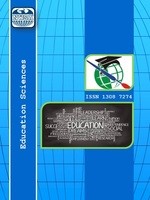YAPILANDIRMACI ÖĞRENME ORTAMI ÜZERİNDE ETKİLİ OLABİLECEK BİR DEĞİŞKEN: ÖĞRETİM STİLİ TERCİHİ
Bu araştırmada sınıf öğretmenlerinin tercih ettikleri öğretim stillerinin belirlenmesi ve tercih ettikleri öğretim stillerinin yapılandırmacı öğrenme ortamı oluşturma düzeyleri üzerindeki etkisinin incenmesi amaçlanmıştır. Bu amaçla araştırmada ilişkisel tarama modeli kullanılmıştır. Öğretmenlerin tercih ettikleri öğretim stilleri, Grasha (1996) tarafından geliştirilen "Öğretim Stili Ölçeği" ile öğretmenlerin yapılandırmacı öğrenme ortamını oluşturma düzeyleri ise Tenenbaum, Naidu, Jegede ve Austin (2001) tarafından geliştirilen "Yapılandırmacı Öğrenme Ortamı Ölçeği" (YÖOÖ) ile ölçülmüştür. Ölçme araçları Mersin ilinde 354 sınıf öğretmenine ve 807 4. ve 5. sınıf öğrencisine uygulanmıştır. Araştırma sonuçları sınıf öğretmenlerinin en fazla tercih ettikleri öğretim stillerinin temsilci/kolaylaştırıcı/uzman ve kolaylaştırıcı/kişisel model/uzman olduğunu göstermiştir. Ayrıca sonuçlar sınıf öğretmenlerinin tercih ettikleri öğretim stillerine göre materyal ve kaynakların çözüme götürmesi, yansıtma ve kavram keşfi için motive etme özelliklerinin farklılık gösterdiğini de ortaya koymuştur.
Anahtar Kelimeler:
Yapılandırmacılık, Öğrenme Ortamı, Öğretim Stili, Öğretmen, Öğrenme,
A VARIABLE WHICH CAN BE EFFECTIVE IN CONSTRUCTIVIST LEARNING ENVIRONMENTS: TEACHING STYLE PREFERENCE
The aim of this research is to determine teaching styles that primary school teachers prefer and examine the effects of teaching styles preferred by primary school teachers on the levels of forming constructivist learning environments. For this aim, the survey method was used in this research. Teaching styles that primary school teachers prefer have been measured using the 'Teaching Style Inventory' developed by Grasha (1996) and teachers' levels of forming constructivist learning environments have been measured using the 'Constructivist Learning Environments Questionnaire' developed by Tenenbaum, Naidu, Jegede, and Austin (2001). The assessment tools were applied to 354 teachers from primary schools, and 807 4th-5th grade primary school students in Mersin. Research results showed that most preferred teaching styles are delegator/ facilitator/ expert styles and facilitator/personal model/expert styles. Research results also showed that there was a significiance difference in properties of material and measures targeted toward solutions, motivation toward reflections and concept investigation according to teaching styles that primary school teachers prefer.
Keywords:
Constructivism, Learning Environment, Teaching Style, Teacher, Learning, ,
- Başlangıç: 2009
- Yayıncı: E-Journal of New World Sciences Academy
Sayıdaki Diğer Makaleler
DEMOKRASİ VE İNSAN HAKLARI EĞİTİMİ
YAPILANDIRMACI ÖĞRENME ORTAMI ÜZERİNDE ETKİLİ OLABİLECEK BİR DEĞİŞKEN: ÖĞRETİM STİLİ TERCİHİ
ÇE?YTLY DE?Y?KENLERE GÖRE ERGENLERDE YNTERNET BA?IMLILI?ININ YORDANMASI
İLKÖĞRETİM 8. SINIF ÖĞRENCİLERİNİN OKUMAYA YÖNELİK TUTUMLARI VE OKUDUĞUNU ANLAMA DÜZEYLERİ
ÖĞRETMEN ADAYLARININ ELEKTRİKTE ALAN BİLGİSİ
Ö?RETMENLERYN Y? DOYUMUNA ETKY EDEN FAKTÖRLERYN YNCELENMESY
SINIF ÖĞRETMENLİĞİ BÖLÜMÜ ÖĞRENCİLERİNİN YARATICI DRAMAYA YÖNELİK TUTUMLARI
